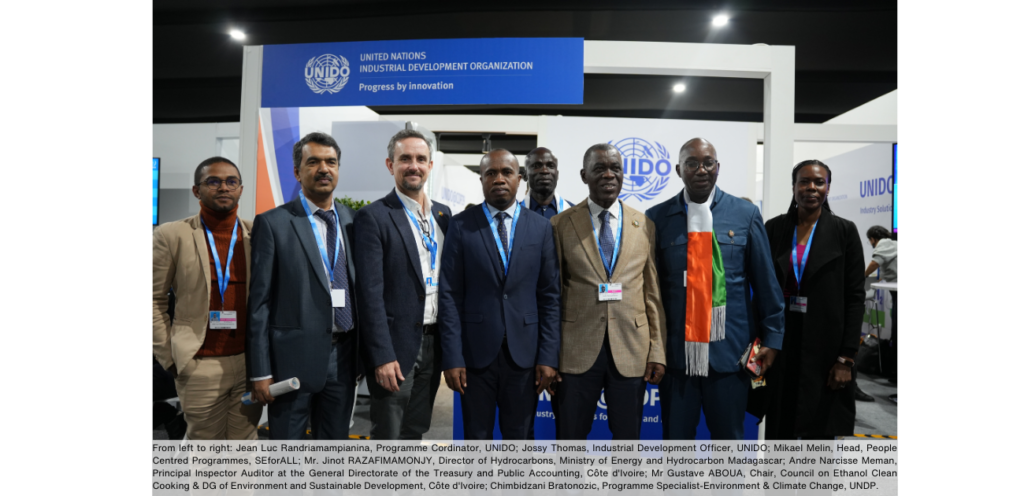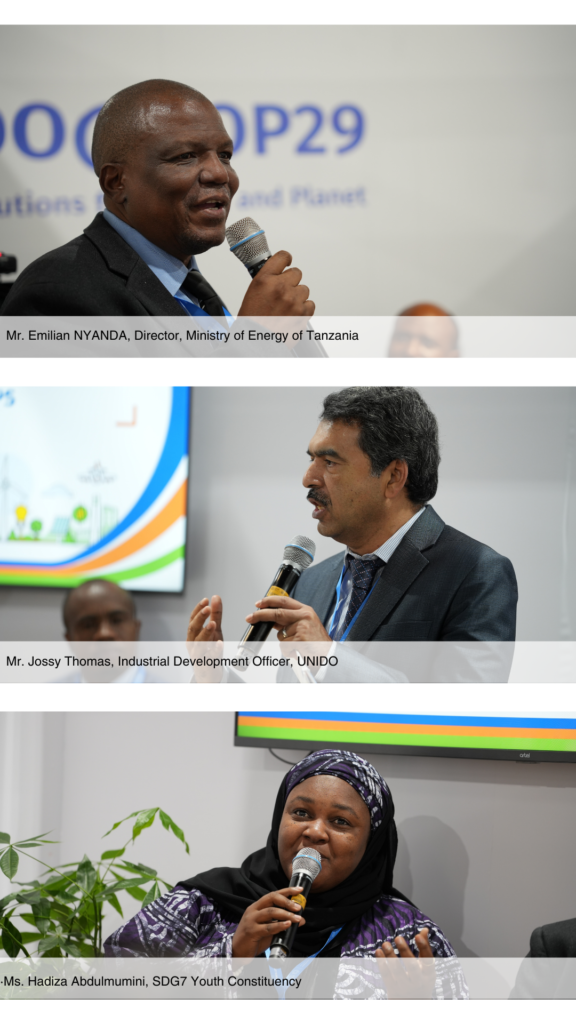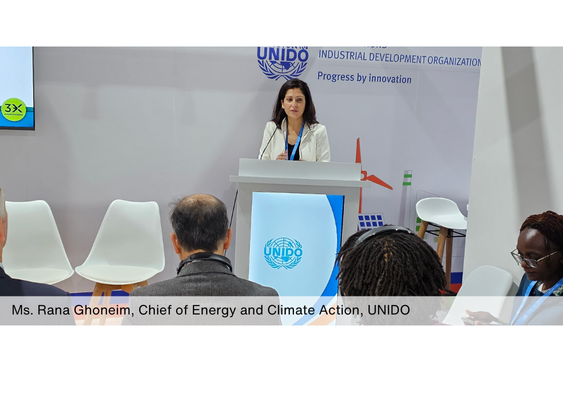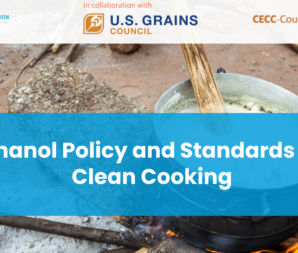Advancing Clean Cooking Solutions: CECC and Partners at COP29
At COP29, the United Nations Industrial Development Organization (UNIDO) and the Council on Ethanol for Clean Cooking (CECC), in collaboration with the Vice-President Office of Tanzania and the Climate Finance & Energy Innovation Hub, hosted two important events focusing on clean cooking solutions. The sessions were designed to address the challenges and opportunities of scaling clean cooking technologies across Africa, with an emphasis on financing, partnerships, and national strategies.

Financing for Scaling Clean Cooking
The first session, titled “Financing for Scaling Clean Cooking,” took place on 14 November 2024 and explored the essential role that financing plays in addressing Africa’s clean cooking needs.
One of the main highlights of the session was Tanzania’s National Clean Cooking Energy Strategy, which aims to provide 80% of its population with access to clean cooking solutions by 2034. This ambitious strategy is central to the country’s efforts to reduce reliance on traditional cooking fuels, which are harmful to both health and the environment. The session also reflected on the African Women Clean Cooking Support Programme (AWCCSP), launched by Tanzania’s President Samia Suluhu Hassan at COP28 in 2023. This program focuses on empowering African women, who are disproportionately affected by the health risks of traditional cooking methods.
The panel also discussed the urgent need for $8 billion in annual investments to achieve universal clean cooking access by 2030, with a focus on innovative financing mechanisms that can mobilize the necessary resources.

Showcasing Partnerships for Scaling Clean Cooking

The second session, titled “Scaling Clean Cooking through Partnerships,” took place later on 14 November and focused on the role of partnerships in accelerating the adoption of clean cooking solutions. While progress has been made in expanding access to clean cooking, 2.1 billion people globally still lack access, with Sub-Saharan Africa being the region most affected.
To meet the clean cooking goals by 2030, the panel emphasized that an annual investment of at least $4 billion is required. The session featured senior officials from Tanzania, Côte d’Ivoire, and Madagascar, who shared their national clean cooking strategies and the challenges they face in scaling these solutions. The discussion also highlighted the importance of collaborative partnerships involving governments, international organizations, and the private sector to deliver sustainable solutions.
UNIDO’s Global Impact Programme was showcased as a model for scaling clean cooking solutions, with pilot projects already underway in Tanzania and Madagascar. New initiatives are also being launched in Mali, Burkina Faso, and Botswana to address the clean cooking needs in these countries. Panelists called for the integration of clean cooking solutions into national energy plans and emphasized the need for strong supply chains and local manufacturing to make clean cooking technologies more accessible and affordable.
Renewable-Based Clean Cooking: A Climate and Development Opportunity
On 15 November 2024, the COP29 Side Event titled “Renewable-Based Clean Cooking: An Opportunity for Climate and Development” was co-organized by IRENA and UNIDO. The session delved into the advantages and challenges of renewable energy-based clean cooking solutions. Panelists included experts from UNIDO, MECS, SNV, NEFCO, SCI, and ECC Advisory, who shared real-life examples of projects that are successfully deploying renewable cooking technologies in developing countries.

The panel emphasized that behavior change communication, as well as the affordability, availability, and accessibility of clean cooking fuels and technologies, are crucial for scaling clean cooking access. During her keynote speech, Ms. Rana Ghoneim, Chief of Energy and Climate Action at UNIDO, highlighted the critical importance of scaling renewable-based solutions for both gender empowerment and just energy transitions in developing countries.
The event was facilitated by Mikael Melin from SEforALL and moderated by Caroline Ochieng from IRENA. They discussed how renewable energy sources, such as ethanol and biogas, can provide scalable solutions that help reduce dependency on harmful cooking methods while contributing to climate goals.
A Call for Urgent Action
One of the primary takeaways from the sessions was the urgent need for innovative financing mechanisms to bridge the funding gap. With $8 billion required annually to meet the clean cooking goals by 2030, new financial models are essential to mobilize the necessary investments. Governments and international partners must work together to create funding mechanisms that can attract private sector investment, ensuring that clean cooking solutions are implemented on a large scale.
Another key takeaway was the importance of partnerships between governments, international organizations, and the private sector. Collaboration across sectors is critical to scaling up clean cooking solutions. The experiences shared by countries like Tanzania, Côte d’Ivoire, and Madagascar demonstrated that when national governments partner with international organizations and the private sector, they can leverage resources and expertise to overcome the barriers to scaling clean cooking solutions.
Additionally, the sessions underscored the need for strong integration of clean cooking solutions into national energy plans. This includes making clean cooking a central component of energy strategies and prioritizing the development of local manufacturing and robust supply chains. Local solutions will be key to ensuring that clean cooking technologies are accessible and affordable for the most vulnerable populations.
Finally, the sessions highlighted that renewable energy-based solutions for clean cooking offer a unique opportunity to drive both climate action and development. By embracing renewable technologies such as ethanol, biogas, and other sustainable fuels, countries can address both health and environmental issues while empowering communities, particularly women, and ensuring a just energy transition.
With the support of partners like the OPEC Fund and SEforALL, and the continued collaboration with countries such as Tanzania, Côte d’Ivoire, and Madagascar, the momentum for achieving universal clean cooking access by 2030 is building. However, urgent action is required to ensure that clean cooking technologies become a reality for millions of people in Africa and other developing regions.


